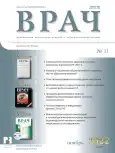Клинический случай поражения центральной нервной системы, ассоциированного с новой коронавирусной инфекцией COVID-19: проблемы диагностики и экспертизы связи с профессией у медицинского работника
- Авторы: Бабанов С.А.1, Азовскова Т.А.1, Лаврентьева Н.Е.1
-
Учреждения:
- Самарский государственный медицинский университет Минздрава России
- Выпуск: Том 33, № 11 (2022)
- Страницы: 52-56
- Раздел: Из практики
- URL: https://journals.eco-vector.com/0236-3054/article/view/321259
- DOI: https://doi.org/10.29296/25877305-2022-11-09
- ID: 321259
Цитировать
Полный текст
Аннотация
Новая коронавирусная инфекция (НКИ) у медицинских работников может рассматриваться как профессиональное заболевание, если инфекция возникла при выполнении ими должностных обязанностей. Одним из важнейших осложнений НКИ (COVID-19) является поражение нервной системы.
С точки зрения патогенеза неврологические нарушения при COVID-19 могут быть обусловлены «цитокиновым штормом», гипоксемией, нарушениями гомеостаза (энцефалопатия критических состояний), нейротропностью и нейровирулентностью SARS-CoV-2 (изолированное поражение черепных нервов, очаговые и диффузные поражения центральной нервной системы), а также смешанным воздействием перечисленных факторов. COVID-19 также влияет на течение хронических неврологических заболеваний.
Спектр неврологических нарушений при COVID-19 широк – от краниальных мононейропатий, клинически проявляющихся аносмией, агевзией/дисгевзией, до острой воспалительной полинейропатии Гийена–Барре и тяжелых поражений головного и спинного мозга в виде острой геморрагической некротизирующей энцефалопатии и миелопатий.
В представленном клиническом случае описано одно из возможных серьезных осложнений COVID-19 – энцефалопатия. В статье представлены принципы и результаты медицинской экспертизы, проведенной в целях установления причинно-следственной связи заболевания с профессиональной деятельностью. Подчеркивается необходимость мультидисциплинарного подхода к диагностике проявлений, лечению COVID-19 и его осложнений с обязательным участием врача-невролога.
Очевидно, что пандемия COVID-19 будет иметь значимые последствия в контексте непосредственных и отдаленных неврологических осложнений.
Полный текст
Об авторах
С. А. Бабанов
Самарский государственный медицинский университет Минздрава России
Автор, ответственный за переписку.
Email: lavrenteva.natalia@yandex.ru
доктор медицинских наук, профессор
Россия, СамараТ. А. Азовскова
Самарский государственный медицинский университет Минздрава России
Email: lavrenteva.natalia@yandex.ru
кандидат медицинских наук, доцент
Россия, СамараН. Е. Лаврентьева
Самарский государственный медицинский университет Минздрава России
Email: lavrenteva.natalia@yandex.ru
кандидат медицинских наук, доцент
Россия, СамараСписок литературы
- Временные методические рекомендации «Профилактика, диагностика и лечение новой коронавирусной инфекции (COVID-19)». Версия 13 (14.10.2021). Минздрав России, 2021.
- Гарипова Р.В., Стрижаков Л.А., Бабанов С.А. Новая коронавирусная инфекция как профессиональное заболевание: сложные экспертные случаи. Мат-лы 16-го Всеросс. конгр. «Профессия и здоровье». Владивосток, 2021.
- Косарев. В.В., Бабанов С.А. Профессиональные заболевания медицинских работников. Самара: ООО «Офорт», 2014; 201 с.
- Новая коронавирусная инфекция COVID-19: профессиональные аспекты сохранения здоровья и безопасности медицинских работников: методические рекомендации. Под ред. И.В. Бухтиярова, Ю.Ю. Горблянского. М.: АМТ, ФГБНУ «НИИ МТ», 2021; 132 c.
- Справочник по формулированию клинического диагноза болезней нервной системы. Под ред. В.Н. Штока, О.С. Левина. М.: МИА, 2010; 519 с.
- Терновых И.К., Топузова М.П., Чайковская А.Д. и др. Неврологические проявления и осложнения у пациентов с COVID-19. Трансляционная медицина. 2020; 7 (3): 21–9. doi: 10.18705/2311-4495-2020-7-3-21-29
- Постановление Правительства РФ от 16.05.2020 №695 «Об утверждении Временного положения о расследовании страховых случаев причинения вреда здоровью медицинского работника в связи с развитием у него полученных при исполнении трудовых обязанностей заболевания (синдрома) или осложнения, вызванных подтвержденной лабораторными методами исследования новой коронавирусной инфекцией и повлекших за собой временную нетрудоспособность, но не приведших к инвалидности».
- Постановление Правительства РФ от 15.12.2000 г. №967 «Об утверждении Положения о расследовании и учете профессиональных заболеваний» (с изменениями и дополнениями).
- Указ Президента РФ от 06.05.2020 №313 (с дополнениями от 30.07.2020 №487) «О предоставлении дополнительных страховых гарантий отдельным категориям медицинских работников».
- Baig A.M., Khaleeq A., Ali U. et al. Evidence of the COVID-19 virus targeting the CNS: tissue distribution, host virus interaction, and proposed neurotropic mechanisms. ACS Chem Neurosci. 2020; 11 (7): 995–8. doi: 10.1021/acschemneuro.0c00122
- Li K., Wohlford-Lenane C., Perlman S. et al. Middle East respiratory syndrome coronavirus causes multiple organ damage and lethal disease in mice transgenic for human dipeptidyl peptidase 4. J Infect Dis. 2016; 213 (5): 712–22. doi: 10.1093/infdis/jiv499
- Desforges M., Miletti T.C., Gagnon M. et al. Activation of human monocytes after infection by human coronavirus 229E. Virus Res. 2007; 130 (1–2): 228–40. doi: 10.1016/j.virusres.2007.06.016
- Li J., Gao J., Xu Y.P. et al. Expression of severe acute respiratory syndrome coronavirus receptors, ACE2 and CD209L in different organ derived microvascular endothelial cells. Zhonghua Yi Xue Za Zhi. 2007; 87 (12): 833–7.
- Li Y.C., Bai W.Z., Hirano N. et al. Neurotropic virus tracing suggests a membranous-coating-mediated mechanism for transsynaptic communication. J Comp Neurol. 2013; 521 (1): 203–12. doi: 10.1002/cne.23171
- Benussi A., Pilotto A., Premi E. et al. Clinical characteristics and outcomes of inpatients with neurologic disease and COVID-19 in Brescia, Lombardy, Italy. Neurology. 2020; 95 (7): e910-e920. doi: 10.1212/WNL.0000000000009848
- Mao L., Jin H., Wang M. et al. Neurologic manifestations of hospitalized patients with coronavirus disease 2019 in Wuhan, China. JAMA Neurol. 2020; 77 (6): 683–90. doi: 10.1001/jamaneurol.2020.1127
- Poyiadji N., Shahin G., Noujaim D. et al. COVID-19- associated acute emorrhagic necrotizing encephalopathy: CT and MRI features. Radiology. 2020; 296 (2): E119-E120. doi: 10.1148/radiol.2020201187
- Paniz-Mondolfi A., Brice C., Grames Z. et al. Central nervous system involvement by severe acute respiratory syndrome coronavirus-2 (SARS-CoV-2). J Med Virol. 2020; 92 (7): 699–702. doi: 10.1002/jmv.25915
- Patersen R.W., Brown R.L., Benjamin L. et al. The emerging spectrum of COVID-19 neurology: clinical, radiological and laboratory findings. Brain. 2020; 143 (10): 3104–20. doi: 10.1093/brain/awaa240
- Zhou L., Zhang M., Wang J. et al. Sars-CoV-2: Underestimated damage to nervous system. Travel Med Infect Dis. 2020; 36: 101642. doi: 10.1016/j.tmaid.2020.101642
- Ye M., Ren Y., Lv T. Encephalitis as a clinical manifestation of COVID-19. Brain Behav Immun. 2020; 88: 945–6. doi: 10.1016/j.bbi.2020.04.017
Дополнительные файлы






